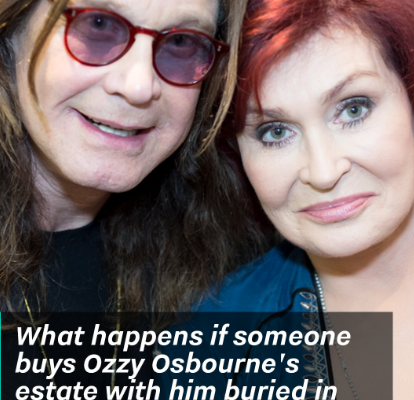What Happens If Someone Buys Ozzy Osbourne’s Estate With Him Buried in the Backyard?
An Unsettling Tale of Rock Legacy, Real Estate Law, and Eternal Rest
When someone purchases a luxury estate, especially one tied to an icon like Ozzy Osbourne—the legendary Prince of Darkness—the assumption is they’re investing in history, rock ‘n’ roll nostalgia, and maybe a gothic wine cellar. But what if that estate comes with something far more permanent? Like the body of Ozzy Osbourne himself, buried right there in the backyard?
Let’s dive into the legal, emotional, cultural, and practical rollercoaster of buying a property that contains the final resting place of a rock legend.
1. Ozzy’s Eternal Backyard Encore: The Hypothetical Scenario
Let’s imagine: Following his passing, Ozzy Osbourne is buried in a private, serene section of his estate—perhaps next to his favorite tree or beneath a wrought-iron monument with bat wings spread wide. Sharon Osbourne, his devoted wife, oversees the interment, choosing to honor his wish of resting forever on the grounds he loved most.
Fast forward several years. The estate is sold. The new owner? A fan? A millionaire looking for privacy? A young tech mogul who doesn’t even know who Black Sabbath is?
Regardless, they’re now living on land where one of rock’s most influential figures lies buried.
2. The Legal Labyrinth: Can You Sell Property With Human Remains?
In the U.S. and the U.K., laws differ by state and county (or council), but one truth remains: you cannot simply bury someone in your backyard without proper permits. So if Ozzy’s burial was legal, it would have required zoning approval, notification to local authorities, and most likely an easement recorded in the property’s deed.
This means any buyer would be fully informed ahead of time that a human body—Ozzy freaking Osbourne—is buried on the premises.
Most jurisdictions require the seller to disclose any gravesites. In some states, graves are considered “encumbrances” to the property. The buyer must acknowledge and agree to take on the responsibility of maintaining or not disturbing the site.
There would likely be restrictions on landscaping, construction, or moving the remains. If Ozzy’s grave was formally designated a family cemetery, it could carry permanent protections.
3. Emotional and Ethical Whirlwind
Imagine sipping coffee on your back patio, gazing over the roses, and knowing the man who bit the head off a bat is six feet under your feet.
Would you feel:
-
Reverent, honored to share space with greatness?
-
Creeped out, like his spirit might whisper lyrics at 3:00 AM?
-
Conflicted, unsure whether to host a barbecue on Ozzy’s birthday or hold a candlelight vigil?
And what of Sharon Osbourne and their children? Would they still have legal access to visit the grave? Could fans demand public access?
This creates a strange tension between private property and public legacy—a sacred rock ‘n’ roll site trapped in a private backyard.
4. Real Estate Value: Haunted or Historic?
Would Ozzy’s burial affect the value of the home? That depends.
Pros:
-
For fans, the property becomes rock royalty real estate.
-
It could be marketed as a musical landmark.
-
Developers could potentially petition to open it as a museum or exclusive retreat.
Cons:
-
Mainstream buyers may be repulsed or legally deterred.
-
Some banks and insurers may shy away.
-
It might limit renovations or resale options.
And let’s be real—how do you stage a home with a grave in the backyard? Cover it with fairy lights?
5. Cultural Complications: Fame, Death, and Public Fascination
The death of a celebrity like Ozzy Osbourne doesn’t silence their fame—it amplifies it. If buried at home, that site becomes something more than real estate. It becomes a symbol. A shrine. A curiosity.
The new owner might face:
-
Paparazzi with drones
-
Die-hard fans leaving candles and notes at the gate
-
Paranormal YouTubers setting up infrared cameras
And what happens on Halloween?
In death, celebrities become stories, and their burial grounds can gain an eerie cultural gravity. Would Ozzy’s grave turn into the Elvis Presley Graceland of heavy metal?
6. Can the Body Be Moved?
This brings up another messy question: Could a future owner petition to have Ozzy exhumed and reburied elsewhere?
Technically, it is possible—but it’s hard and controversial. It would require:
-
Consent from the Osbourne family
-
Court orders
-
Public notice
-
Major legal justification
Emotionally and culturally, the backlash could be brutal. Tampering with a legend’s resting place could spark media storms, lawsuits, and fan outrage. It’s the kind of chaos Ozzy himself might chuckle at from beyond the grave.
7. Sharon’s Role: Still the Gatekeeper?
It’s not hard to imagine Sharon Osbourne retaining some legal stake in the property even after selling it. She might create a trust or easement to protect the grave site. In some cases, family cemeteries require a designated caretaker—and who better than Sharon?
She may still visit. She may still lay flowers. She might still fight anyone who so much as plants a hedge near Ozzy’s tombstone.
And in interviews, she might raise hell if someone builds a pool bar ten feet from her husband’s grave.
8. Final Thoughts: A Restless Peace
Buying Ozzy Osbourne’s estate—complete with his grave—would be more than a transaction. It would be an inheritance of legacy, a heavy one. You wouldn’t just own the property. You’d become the keeper of a story. A bizarre, beautiful, unsettling story of a man who changed music forever and now lies beneath a patch of grass that used to host wild parties and guitar solos.
If handled with respect, it could become a place of reflection, celebration, even tourism. But if mishandled, it could stir fans, tabloids, and maybe even something beyond the veil.
After all, this is Ozzy Osbourne we’re talking about. Prince of Darkness. Rock god. And possibly, your eternal backyard roommate.


